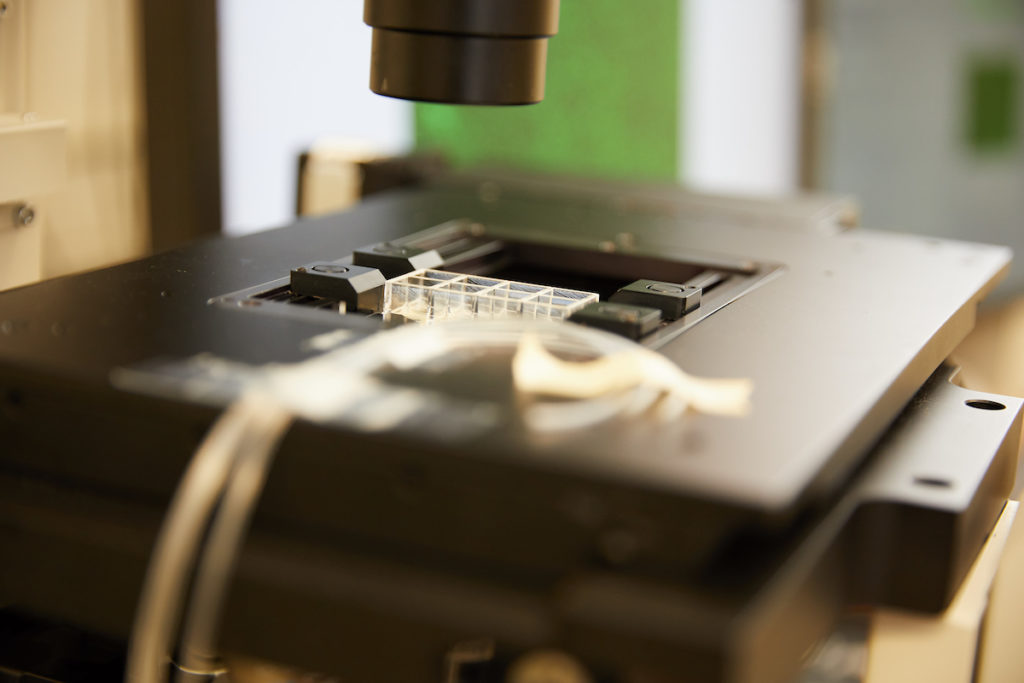Posted 3:28 p.m. Tuesday, Aug. 1, 2017
As $338K grant works to prevent heart attacks and strokes, UWL students get experience.
As $338K grant works to prevent heart attacks and strokes, UWL students get experience
A large National Institutes of Health grant will help a UW-La Crosse faculty member continue research with major medical implications, while training the next generation of scientists and healthcare professionals. UWL Biology Professor Scott Cooper received the approximately $338,000 grant in July, which will support his decade-long study that aims to understand how to prevent blood from clotting. Results could help prevent heart attacks and strokes, the first and third most common cause of death in the U.S. In addition to health implications, the grant will also help pay for the up to 30 undergraduate students who join Cooper in his lab each semester to carry out the research. Cooper says his default answer when students ask to participate in his lab is, “yes.” Seniors train newer students. If students contribute to findings, they become co-authors on publications. “Grants like Dr. Cooper’s provide significant financial support for students to actively participate in the innovation and discovery taking place through faculty’s research,” says Melissa Nielsen, UWL director of Research & Sponsored Programs. It is important for UWL faculty to do research, first and foremost, because of the experience it gives students, says Mark Sandheinrich, interim dean of UWL’s College of Science and Health. Students learn skills like problem solving, critical thinking, working on a team, writing, presenting results, and more. Some experiences they wouldn’t be able to get in a classroom setting, yet they are critical to employers and when applying to graduate schools. Tanner Tenpas started undergraduate research in Cooper’s lab while taking an introductory biology class. A senior this fall, he still remembers how intimidated he felt the first day. He was a non-traditional student attending college as a full-time paramedic. He was surrounded by academics — and a research project he didn’t fully understand. Little by little, he developed an understanding— of the concept behind the research and the lab techniques. And he’s been able to apply this undergraduate research foundation in advanced-level science courses. [caption id="attachment_49438" align="alignleft" width="594"] Confocal microscope in the Howard Imaging Center. Student Tanner Tenpas says undergraduate research has given him confidence with techniques he’ll use in graduate school and in a future medical career such as using high tech equipment.[/caption]
Tenpas says the main thing undergraduate research has given him is confidence. Next summer he’ll be taking the Medical College Admission Test (MCAT), and will eventually apply to medical school to become a doctor.
“When you start out, you see all these professors who are so good at what they do and are so knowledgeable. It’s hard to see where they came from,” he says. “Undergraduate research gave me confidence that anyone can start at the bottom and work their way up — it doesn’t take a genius to work in science.”
Research also allows faculty to stay engaged and current in their field, which they apply in classrooms, says Sandheinrich.
“I think of it this way, would you like to take piano lessons from someone who doesn’t play?” he asks. “That’s why we need to have faculty, even as full professors, engaged in original scholarship.”
Cooper collaborates with Mayo Clinic in Rochester, as well as several universities on the grant, including Harvard University, Colorado School of Mines, and University of Toronto. The collaborators have instruments that UWL does not have access to, so they are able to run experiments on samples for Cooper. When they have results, the institutions will publish together.
“Some think innovation and discovery only happens at larger, research intensive universities, but predominantly undergraduate institutions like UWL are also actively engaged in cutting-edge research,” says Nielsen. That’s critical to UWL’s mission of student success, she adds.
Confocal microscope in the Howard Imaging Center. Student Tanner Tenpas says undergraduate research has given him confidence with techniques he’ll use in graduate school and in a future medical career such as using high tech equipment.[/caption]
Tenpas says the main thing undergraduate research has given him is confidence. Next summer he’ll be taking the Medical College Admission Test (MCAT), and will eventually apply to medical school to become a doctor.
“When you start out, you see all these professors who are so good at what they do and are so knowledgeable. It’s hard to see where they came from,” he says. “Undergraduate research gave me confidence that anyone can start at the bottom and work their way up — it doesn’t take a genius to work in science.”
Research also allows faculty to stay engaged and current in their field, which they apply in classrooms, says Sandheinrich.
“I think of it this way, would you like to take piano lessons from someone who doesn’t play?” he asks. “That’s why we need to have faculty, even as full professors, engaged in original scholarship.”
Cooper collaborates with Mayo Clinic in Rochester, as well as several universities on the grant, including Harvard University, Colorado School of Mines, and University of Toronto. The collaborators have instruments that UWL does not have access to, so they are able to run experiments on samples for Cooper. When they have results, the institutions will publish together.
“Some think innovation and discovery only happens at larger, research intensive universities, but predominantly undergraduate institutions like UWL are also actively engaged in cutting-edge research,” says Nielsen. That’s critical to UWL’s mission of student success, she adds.
